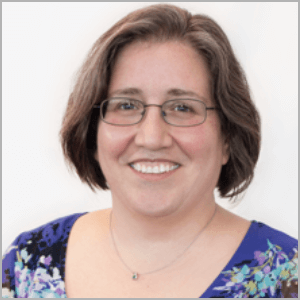- BLOG HOME
- »
- Empowering Leadership & Growth
- »
- Clearinghouse Chief Data Officer Discusses Data with The Higher Edge Podcast

Clearinghouse Chief Data Officer Discusses Data with The Higher Edge Podcast
Using Data to Drive Meaningful Change in Higher Ed
Roberta Hyland, chief data officer for the National Student Clearinghouse, recently spoke with The Higher Edge, a podcast for the brightest minds in higher education. The Higher Edge interviews change-makers and rule-breakers, driving meaningful, impactful change for colleges and universities across the country. Host Brendan Aldrich chatted with Hyland about how the Clearinghouse uses its data to improve student success.
The Clearinghouse as a Data Collaborative
Clearinghouse President Rick Torres often refers to the organization as a data collaborative, Hyland shared. Instead of just collecting data, the Clearinghouse puts the data to work for those who provide it.
When an institution shares its data with the Clearinghouse, we help them understand more about themselves and their learners, shedding light on issues the institutions may not be inherently able to see. These collaborations pay real dividends: the services that the Clearinghouse provides to participating institutions have saved those institutions more than $750 million a year.
In addition, the Clearinghouse aggregates the data it receives to provide insights at the national level. This helps inform the research community about what’s working and not working in education.
Providing Value to the Entire Higher Education Ecosystem
As a mission-driven organization, the Clearinghouse covers the entire higher education ecosystem, from small colleges to large universities. The Clearinghouse provides paths for institutions of all sizes to grow at the pace that’s best for them, known internally as the “fast, faster, fastest” progression. Take, for instance, transcript services. For some institutions, the Clearinghouse might provide an interface for students to log in to pay for a copy of their transcripts while the institution fulfills the request. Other institutions may be ready to jump into automation for electronic transmission of transcripts.
Balancing the Uniqueness of Institutions and the Need for Standardization
One of the strengths of the U.S. education system is its diversity. Different institutions have different missions, which can manifest in various processes, calendars, mechanisms of education delivery to students, and more. This is a challenge from a data perspective because as much as researchers want to think about data as common and relatable, the uniqueness of each institution must be considered. This is critical to truly understanding what is going on in higher education.
This is one area where the Clearinghouse got it right from the beginning, stated Hyland. The Clearinghouse allows institutions to share their unique characteristics so that data can be reported in the appropriate context. It’s a balancing act but losing the uniqueness of institutions doesn’t help anyone.
“When you are mission-driven, you are there for the diversity of the education system, and that’s what we focus on at the Clearinghouse,” Hyland shared.
The Clearinghouse’s Role in Natural Disasters
Natural disaster aid is not something people usually think of when they think of the Clearinghouse, but it is an essential service. Should an institution be in the path of a hurricane, wildfire, or another natural disaster, the Clearinghouse can help ensure that the campus has the most updated student data for verification requests, government waivers, etc.
Data on the Lost Generation of Covid-19 Learners
The Clearinghouse works with secondary and higher education institutions to track learning loss due to Covid-19. For example, are students completing high school and then going to college? What does the college journey look like; are they staying enrolled as long, or are they stopping? It’s important to look at the data to understand the initial implications, as well as to follow it long term.
Making Data Fun
Being the chief data officer at the National Student Clearinghouse is fun for Hyland because she’s constantly looking for ways to help others learn more about data and not be afraid of it. “I’m always asking questions,” she said, “so always looking to learn. But I’m also always looking to help others learn and come along with that learning journey.”
To listen to the entire interview, visit The Higher Edge podcast website.

“When you are mission-driven, you are there for the diversity of the education system, and that’s what we focus on at the Clearinghouse.”
Roberta Hyland
Chief Data Officer, National Student Clearinghouse
Additional Resources:



